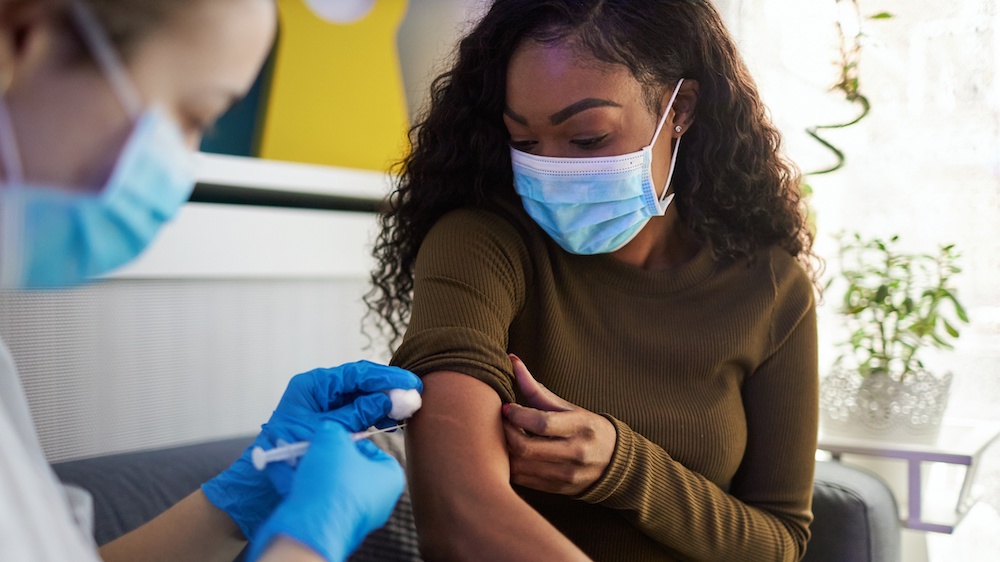If you’re interested in sharing your opinion on any cultural, political or personal topic, create an account here and check out our how-to post to learn more.
____
2020 was a year like no other. The novel coronavirus ushered us into a global state of unprecedented emergency. Businesses were shut down, the economy was crushed and health was at the forefront of our minds — this being a first for many. For communities of color, the impact of COVID-19 was magnified. In addition to its disproportionate impact on Black Americans, the darkness of the pandemic brought light to health inequalities that have long been an issue in America.
Now, as the emergence of COVID-19 vaccines shed light at the end of the tunnel for some, it presents another hurdle for others, namely those of diverse populations. Race is one of many factors that play a significant role in a person’s likelihood to get vaccinated for COVID-19, but for Black Americans, that impact is greater. The long-standing mistrust in health care by Black communities is one of many factors that continues to fuel the significant hesitancy Black Americans have toward the vaccine, with just 42% of Black Americans inclined to get the vaccine as of November, compared to 60% of the general population.
Institutional mistrust, fostered by a history of medical experimentation and unequal access to care, has manifested deep within communities of color, and a change is long overdue. Bridging that divide is critical to Black, Hispanic and Indigenous communities receiving the COVID-19 vaccination, and the task falls on us – it’s the responsibility of health care systems like my own, AdventHealth. It’s the duty of leaders across multiple industries to commit to building trust within these communities, rather than simply pushing the message of the vaccine’s importance.
As physicians, we must combat vaccine hesitancy in Black Americans by providing access, action and information. Cementing a foundation of trust by sharing information with the groups that have been hit the hardest is vital. The broader medical and scientific community still has some work to do in this space. A big part of that requires listening from a place of humility — understanding the misdeeds of the past still echo today, accepting responsibility for that history and taking the concerns of minority communities seriously.
As a leading health care system with hospitals across nine states, AdventHealth strives to take action, backed by research, and lead by example. We recently conducted a survey to gauge consumers’ perceptions on COVID-19 vaccine readiness. As of January 25, 2021, 109,000 consumers, segmented by age, sex and region, had responded. Of those 109,000 responses, about 66,000 responses were analyzed based on race and diversity. 39% of Black survey participants reported a positive likelihood of getting the vaccine, compared to 62% likelihood for white participants. Women are also more hesitant to get the vaccine than men across all respondents.
While the data is important, what we do with that data is even more important — how we leverage this research in a thoughtful manner to address the issue at-hand. From conducting this survey to proactive hiring efforts to a unique focus on addressing racial disparities, AdventHealth is using its resources to sharpen its focus in these important areas.
As Black physicians, we must act as trust messengers to our patients and communities. We need Black leaders leading by example — encouraging participation in research, receiving and administering the vaccine, helping to push for accessible, equitable distribution. We must share our own stories so we can lead the narrative and offer a voice the Black community trusts. Our health systems, organizations and more must join in to help amplify our voices to make that institutional level change.
More than 12 million COVID-19 vaccinations have been administered across the country, and while hope seems to be at arm’s length, our society is finally beginning to understand we will fail to control the current pandemic if issues of inequity are not thoughtfully addressed.
“How do we reckon with the past while ensuring that these new vaccinations are safely distributed in a way with outreach that is intersectional and inclusive?”
A problem of this magnitude that has lasted for generations will not be solved overnight, but opening and maintaining that dialogue is one step in the right direction.
Progress is impossible without change. Change is what makes us grow — as an industry, as a society and as a nation.
____
Alric Simmonds, MD is the Chief Health Equity Officer, Chief Medical Officer and General Surgeon at AdventHealth.

